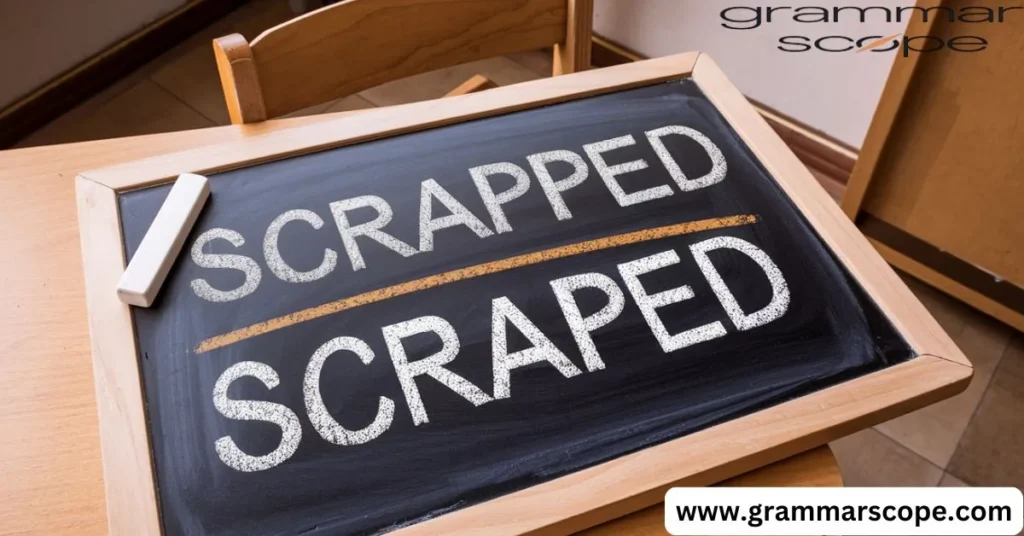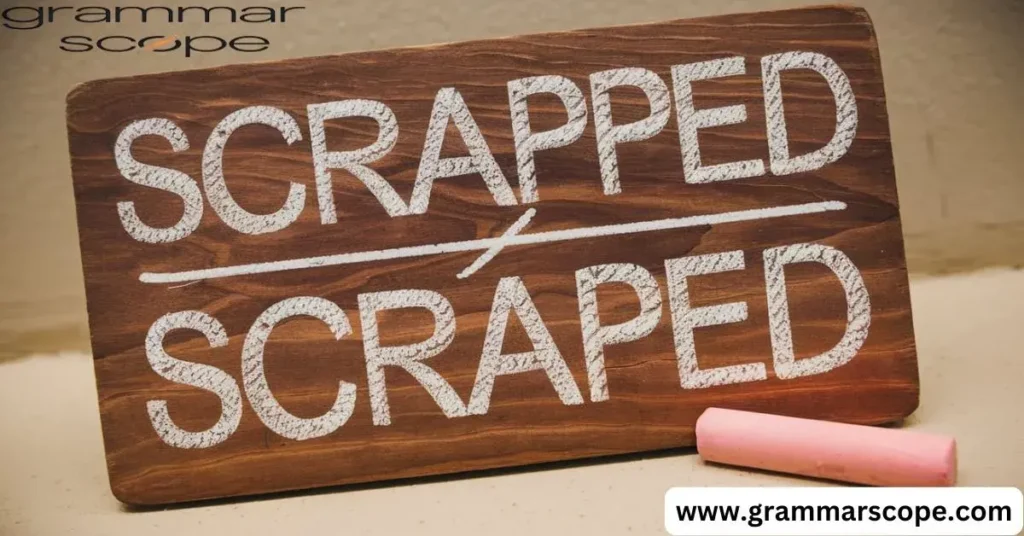Scrapped or scraped? It’s a question that has puzzled many, thanks to their similar spellings and overlapping pronunciations. These two words, while sounding alike, carry entirely different meanings, which often leads to confusion. Imagine sending an email or holding a conversation where the wrong word creates a misunderstanding it’s a common mistake, but one we can easily avoid. Let’s dive deeper into these terms to ensure you never mix them up again.
In the English language, words like “scrapped” and “scraped” are known as heterography words that sound similar but have different meanings and spellings. Such words can trip up even native speakers, but understanding their unique meanings and uses will make your communication clearer and more professional. Whether you’re writing an email, crafting a report, or chatting with a friend, knowing the differences can save you from unintended embarrassment.
This article will break down the definitions, origins, and practical applications of “scrapped” and “scraped.” By the end, you’ll not only understand their distinctions but also feel confident using them correctly in various contexts. Let’s clear up the ambiguities once and for all.
Why Is There Confusion?

The confusion between “scrapped” and “scraped” arises primarily because they are homophones in certain accents words that sound similar but have different meanings and spellings. Additionally, their usage in similar contexts, such as describing removal or abandonment, blurs the lines further. For example, saying, “I scrapped the idea” and “I scraped the surface” might seem related, but the actions involved are entirely different.
Understanding the nuances of these words requires examining their meanings, origins, and applications in detail. Let’s start with their individual definitions to untangle the confusion.
What Does the Word “Scrapped” Mean?
The word “scrapped” is derived from “scrap,” meaning to discard or abandon something entirely. It’s often used in contexts where a plan, idea, or object is canceled, thrown away, or rendered useless.
Example in Context:
- Scenario: A project manager emails their team:
- Subject: Project Update
- Body: “After reviewing the budget constraints, we’ve decided to scrap the current proposal and start fresh.”
Here, “scrap” indicates a deliberate decision to discard the proposal entirely.
Synonyms for Scrapped:
- Canceled
- Abandoned
- Discarded
- Terminated
- Rejected
What Does the Word “Scraped” Mean?
“Scraped” comes from “scrape,” which refers to the act of removing material from a surface by rubbing or dragging an object across it. It is often used in physical contexts but can also have metaphorical applications.
Example in Context:
- Scenario: A homeowner texts a cleaning service:
- “The paint is peeling, and I need someone to scrape the old layers off the walls before repainting.”
In this case, “scrape” describes the physical act of cleaning or removing something from a surface.
Synonyms for Scraped:
- Cleaned
- Polished
- Scoured
- Shaved
- Grazed
“Scrapped” vs “Scraped”: Differences

The primary difference between “scrapped” and “scraped” lies in their meanings and contexts:
| Aspect | Scrapped | Scraped |
|---|---|---|
| Definition | Discarded, abandoned, or canceled | Removed material by rubbing or dragging |
| Context | Plans, projects, ideas | Physical removal or slight damage |
| Synonyms | Canceled, abandoned, discarded | Cleaned, scoured, shaved |
These distinctions highlight their unique interpretations and ensure you use the right term in the right context.
Which One Should You Use: “Scrapped” or “Scraped”?
When deciding between “scrapped” and “scraped,” the context is crucial. If you’re talking about abandoning an idea or plan, use “scrapped.” If you’re describing cleaning or removing something, “scraped” is the correct choice.
Pro Tip:
To avoid confusion, think of “scrapped” as related to discarding or abandoning, while “scraped” involves physical action or damage. Keeping this distinction in mind will make your usage precise and professional.
Examples in Context
Examples of Scrapped:
- Email to a Colleague:
- “Due to new regulations, the marketing team has scrapped the initial campaign and is brainstorming alternatives.”
- Conversation with a Friend:
- “I was planning a road trip, but I had to scrap it because of the weather.”
Examples of Scraped:
- Text Message:
- “I accidentally scraped my car against the wall while parking.”
- Household Chore:
- “Before applying the new wallpaper, make sure to scrape off the old adhesive completely.”
Synonyms and Similar Terms to “Scrapped” and “Scraped”
Synonyms for Scrapped:
- Discarded: “The broken chair was discarded.”
- Abandoned: “She abandoned her initial design.”
- Canceled: “The meeting was canceled due to unforeseen circumstances.”
Synonyms for Scraped:
- Cleaned: “The grill was cleaned thoroughly after the barbecue.”
- Polished: “He polished the silverware until it shone.”
- Grazed: “She grazed her knee while hiking.”
Origins of “Scrapped” and “Scraped”

Origins of Scrapped:
“Scrapped” stems from Middle English “scrap,” referring to small pieces or fragments. Over time, it evolved to signify abandoning or discarding something entirely.
Origins of Scraped:
“Scraped” traces back to Old Norse “skrapa,” meaning to scratch or graze. Its usage expanded to include cleaning and removing material.
Frequently Asked Question
Which is correct, scrapped or scraped?
The correct choice between “scrapped” and “scraped” depends entirely on the context in which you are using the word:
- Use “scrapped” when referring to abandoning, discarding, or canceling something, such as a plan, idea, or object. For example: “We scrapped the old project due to budget constraints.”
- Use “scraped” when describing a physical action of removing material by rubbing or dragging, or when referring to slight damage caused by friction. For example: “She scraped the mud off her boots before entering the house.”
Is it web scraped or web scrapped?
The correct term is “web scraped”.
- Web Scraped: Refers to the process of extracting data from websites using automated tools or scripts. Example: “The data was web scraped from various online sources.”
- Web Scrapped: This is incorrect in the context of data extraction. “Scrapped” typically means discarded or rejected, unrelated to web data extraction. Example: “The old project was scrapped due to budget constraints.”
What is the difference between scraping and scrapping?
- Scraping: Means extracting or collecting data or material. Example: “Web scraping gathers data from websites.”
- Scrapping: Means discarding or getting rid of something, or engaging in a fight. Example: “The old project was scrapped due to lack of funds.”
What do you mean by scrapped?
Scrapped means discarded, abandoned, or eliminated. It refers to getting rid of something that is no longer useful, needed, or viable.
Examples:
- Project Abandonment: “The old website design was scrapped due to technical issues.”
- Material Disposal: “The damaged car was scrapped for parts.”
- Colloquial Use: “They scrapped their vacation plans due to bad weather.”
How do you use scraped in a sentence?
The word “scraped” can be used in various contexts, usually indicating that something has been removed or damaged by scraping. Here are some examples of how to use “scraped” in a sentence:
- Physical scraping:
- “She scraped the mud off her shoes before entering the house.”
- Injuries or damage:
- “He scraped his knee while running in the park.”
- Collecting information or data (commonly in tech contexts):
- “The programmer scraped data from multiple websites to analyze trends.”
- Cleaning or removing something:
- “I scraped the last bit of frosting off the cake plate with a spatula.”
- Financial or personal hardship (colloquial):
- “They barely scraped by last month, but they’re doing better now.”
Conclusion
Understanding the differences between “scrapped” and “scraped” can significantly improve your communication. These words, though similar, have distinct meanings and uses that suit specific contexts. Whether you’re discussing a discarded plan or a cleaned surface, choosing the right term ensures clarity and professionalism.
Next time you encounter these terms, remember their unique origins, meanings, and applications. With this guide, you’re now equipped to use “scrapped” and “scraped” accurately in any scenario.

Emma Olivia is an experienced blogger and the creative mind behind Grammar Scope. With a passion for language and years of writing expertise, she crafts engaging, informative content that simplifies grammar and writing tips for readers worldwide. Emma’s dedication to clear communication and love for the written word shine through every article she publishes, making Grammar Scope a trusted resource for language enthusiasts and learners alike.







